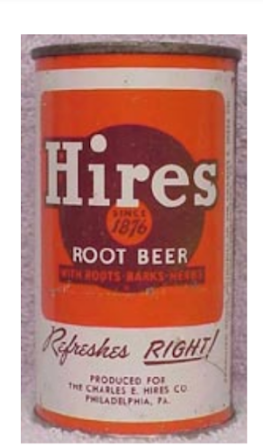Charles Hires, Philadelphia pharmacist, was on his honeymoon around the same time when he discovered an herbal tea. During honeymoon he was served root tea made up of sixteen wild roots and berries, including, pipsissewa, spikenard, juniper wintergreen, sarsaparilla, and hops. Charles persuaded his hostess to part with her recipe for root tea.
After taking the recipe of herbs, berries and roots home to Philadelphia with him, he began selling a packaged dry mixture to the public made from many of the same ingredients as the original herbal tea. Well received, Hires soon developed a liquid concentrate blended together from more than 25 herbs, berries and roots.
Hires originally developed his root beer as a medicinal syrup or tonic, while still living on his father’s farm in Stow Creek Township.
Hires decided to call his herbal tea “root beer” at the suggestion of a friend, Dr. Russell Conwell (founder of Temple University) who thought that given the popularity of beer at the time, more people would buy it.
The public loved the new drink and as a result, Hires introduced commercial root beer to the public in 1876 at the Philadelphia Centennial Exhibition. In no time, it became a popular drink of its day. The Hires family continued to manufacture root beer and in 1893 first sold and distributed root beer in bottle.
Charles Hires sold 115,000 glasses of root beer during their first year. That quickly expanded to 700 million glasses. The Hires Root Beer Company lost the patent for the name “Root Beer” in 1879. Charles remained in charge of his company until 1925, when his two sons took over.
In 1919, Prohibition was introduced in the United States. No longer were people allowed to consume alcoholic beverages, including beer. Prohibition lasted until 1933, and during that time, Hires continued to solidify itself as one of the most popular, and healthy drinks in America.
Hires Root Beer
The Evolution of Modern Food Flavor
-
The evolution of modern food flavor is a story shaped by scientific
curiosity, technological progress, and the growing demands of an
industrialized world. ...






